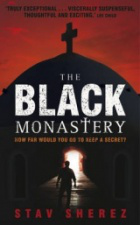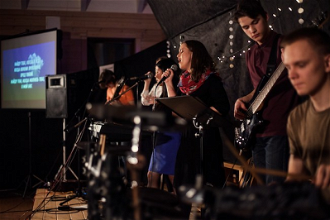New novels: Cupboard Love; The Black Monastery; Nobilitas

On receiving Laura Lockington's Cupboard Love (The Book Guild, £9.99) I didn't really know what to expect. Was it going to be, as I thought from the publicity blurb, another foodie journey? What I actually got, much to my delight, was one of the most fascinating memoirs I've read for some time. Ms Lockington does not chronicle her rather avant garde life in any particular order, but by remembering people and events in the context of meals she has cooked or those which have been cooked for her.
Each new chapter is introduced with a recipe, followed by the memories and anecdotes induced by these various culinary delights. In the first chapter - Grandmothers: Putting the Fun in Funeral, Laura remembers her early childhood and introduces us to her colourful and eccentric family, in particular Grace Helen, her maternal grandmother, a once beautiful and still elegant and socially aware lady, and her paternal grandmother Matilda Mary Anne, the landlady of the Robin Hood pub in the East End of London, a wonderful 'rough diamond'.
Ham Cooked in Cider is the funeral dinner for Matilda Mary Anne following her sudden demise, and forms the basis of the subsequent culinary adventures. In the early 1970's, following a disastrous and chaotic attempt to see Jimi Hendrix perform at the Isle of Wight Festival, which ends in a total shambles, she extols the virtues of 'Snape,'a repast of mashed potato, spring onions, simmered in milk, after which salt, pepper and butter are added, real comfort food! The final chapter is, for me at least, the most poignant. Having lost her beloved mother 'Strawy' some months before Christmas the author is in a downward spiral of misery and depression, with Christmas, in her words, "cancelled from now on!" However, after wallowing in self-pity for several months she decided this couldn't go on and sallied forth on a last-minute Christmas food shopping spree, following which she invited all remaining family and friends and cooked her first Christmas dinner alone. In one particularly moving passage she tells us it was her mother's hands, not hers, that actually prepared the wonderful feast they all enjoyed. Cupboard Love is funny, outrageous and irreverant, and one cannot fail to succumb to Ms Lockington's style and undoubted joi d'vivre.
The Black Monastery (Faber & Faber, £12.99), on the other hand, is a dark, strange and disturbing novel from the pen of Stav Sherez. The Greek island of Palassos was once a paradise, where visitors came for the ruins and tranquility. Now it is a haven for party-goers and drug abusers. In the grounds of an old monastery the body of a boy is found bearing all the hallmarks of a ritual killing. Although they try to forget the past the local population still remember two similar atrocities in the 1970's which were linked to a strange and mysterious cult who inhabited the interior of the island. One such local is Nikos. Nikos has been persuaded to return after years in Athens to pan out the final months of his career as Chief of Police on Palassos.
As he begins his investigation into the gruesome murder, two British tourists arrive on the Island, crime writer, Kitty Carson, and Jason, an aspiring young writer who is infatuated with Kitty and who has been secretly following her. They arrive just in time for a second murder. This time, though, it is that of a young girl, although the details are the same - staked to an altar, the faceless skull staring into nothingness. But this time there are no hippies to blame for the murders. The investigation is further clouded by the disappearance of two old Greek Orthodox Priests who once inhabited the old, ruined monastery. When one turns up dead it is another headache for Nikos.Many more gruesome secrets emerge before there can be any closure for this tortured island. This novel won't do any favours for tourism to the Greek Islands and may not be to everyone's taste. I found it easy to lose the thread in certain sections, but stick with it and you emerge with a compelling story of murder and revenge that holds the attention of the reader.
AD 408 and Britain is under attack. This is the basis of Neil Himsworth's Nobilitas (The Book Guild, £17.99). The previous year the bulk of the Roman Legions were withdrawn to fight in other volatile regions of the empire.and the last vestiges of this once mighty army are threatened by a coalition of Picts and Saxons who are taking full advantage of their depleated numbers. Pleas to the Emperor Honorius for assistance do not bear fruit, the Emperor only freeing Britannia from its obligation to the empire and bidding them, basically, to look after themselves. Do the remaining soldiers return to the continent, or do they stay and defend the land which most now call home and in which they have raised their families. One who decides to stay is Mannius a seasoned veteran and surgeon who's skills are in great demand by soldier and civilian alike. Together with Hen Coel , king of the Votadini, Romes only remaining indigenous ally, he must face overwhelming odds to supress the Barbarian invaders from north of the wall and also defend himself against treachery closer to home.
Although Himsworth writes in the modern vernacular and the story and most of the characters are fictional, he has gone to great pains to accurately research the actual historical background. Hen Coel (Old King Coel) did, apparently, exist, but perhaps not the nursery rhyme character! Nobilitas is stirring stuff and highly recommended for readers of this particular genre.


















